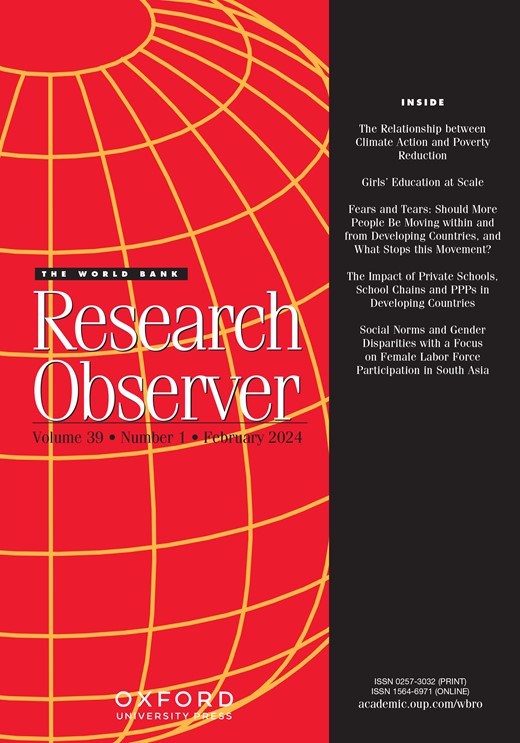Beyond Poverty Escapes—Social Mobility in Developing Countries: A Review Article
IF 3.3
1区 经济学
Q1 DEVELOPMENT STUDIES
引用次数: 36
Abstract
While social mobility in advanced economies has received extensive scholarly attention, crucial knowledge gaps remain about the patterns and determinants of income, educational, and occupational mobility in developing countries. Focusing on intergenerational mobility, we find that estimates often differ greatly for the same country, depending on the concept and measure of mobility used, on variable constructions and on the data set utilized. There is also wide variation in mobility across regions and social groups. We discuss data and income and other variable measurement challenges when agriculture and the informal sector absorb most of the workforce, and illustrate why occupational classifications and widely used mobility measures may perform less well in such settings. Factors beyond those featuring in the literature on advanced economies are plausible determinants of social mobility, particularly of what we call moderate and large ascents (and descents), in developing country contexts. We highlight the lack of in-depth understanding of the multiple and often localized hurdles to such more pronounced progress. Similar knowledge gaps exist for large descents, which give rise to particularly profound concerns in low-income settings. We report and touch on the implications of suggestive findings of a disconnect between educational and occupational mobility. Innovative research requires critical engagement with theory and with methodology, identification, and data challenges that may overlap or deviate notably from those encountered in advanced economies.超越贫困的逃亡——发展中国家的社会流动:一篇评论文章
虽然发达经济体的社会流动性受到了广泛的学术关注,但在发展中国家,关于收入、教育和职业流动性的模式和决定因素,仍存在重大的知识缺口。关注代际流动性,我们发现,根据所使用的流动性概念和衡量标准、变量结构和所使用的数据集,对同一个国家的估计往往存在很大差异。区域和社会群体之间的流动性也存在很大差异。我们讨论了在农业和非正规部门吸收了大部分劳动力的情况下,数据、收入和其他变量测量面临的挑战,并说明了为什么职业分类和广泛使用的流动性测量在这种情况下可能表现不佳。在发达经济体的文献中所描述的因素之外,其他因素似乎是社会流动性的决定因素,特别是在发展中国家,我们称之为适度和大幅上升(和下降)的因素。我们强调,对这种更明显的进展所面临的多重且往往是局部的障碍缺乏深入了解。大幅度下降也存在类似的知识差距,这在低收入环境中引起了特别深刻的关切。我们报告并触及教育和职业流动性之间脱节的暗示性发现的含义。创新研究需要对理论、方法、识别和数据挑战进行批判性的参与,这些挑战可能与发达经济体中遇到的问题重叠或明显偏离。
本文章由计算机程序翻译,如有差异,请以英文原文为准。
求助全文
约1分钟内获得全文
求助全文
来源期刊

World Bank Research Observer
Multiple-
CiteScore
12.60
自引率
1.20%
发文量
8
期刊介绍:
The World Bank Journals, including the Research Observer, boast the largest circulation among economics titles. The Research Observer is distributed freely to over 9,100 subscribers in non-OECD countries. Geared towards informing nonspecialist readers about research within and outside the Bank, it covers areas of economics relevant for development policy. Intended for policymakers, project officers, journalists, and educators, its surveys and overviews require only minimal background in economic analysis. Articles are not sent to referees but are assessed and approved by the Editorial Board, including distinguished economists from outside the Bank. The Observer has around 1,500 subscribers in OECD countries and nearly 10,000 subscribers in developing countries.
 求助内容:
求助内容: 应助结果提醒方式:
应助结果提醒方式:


